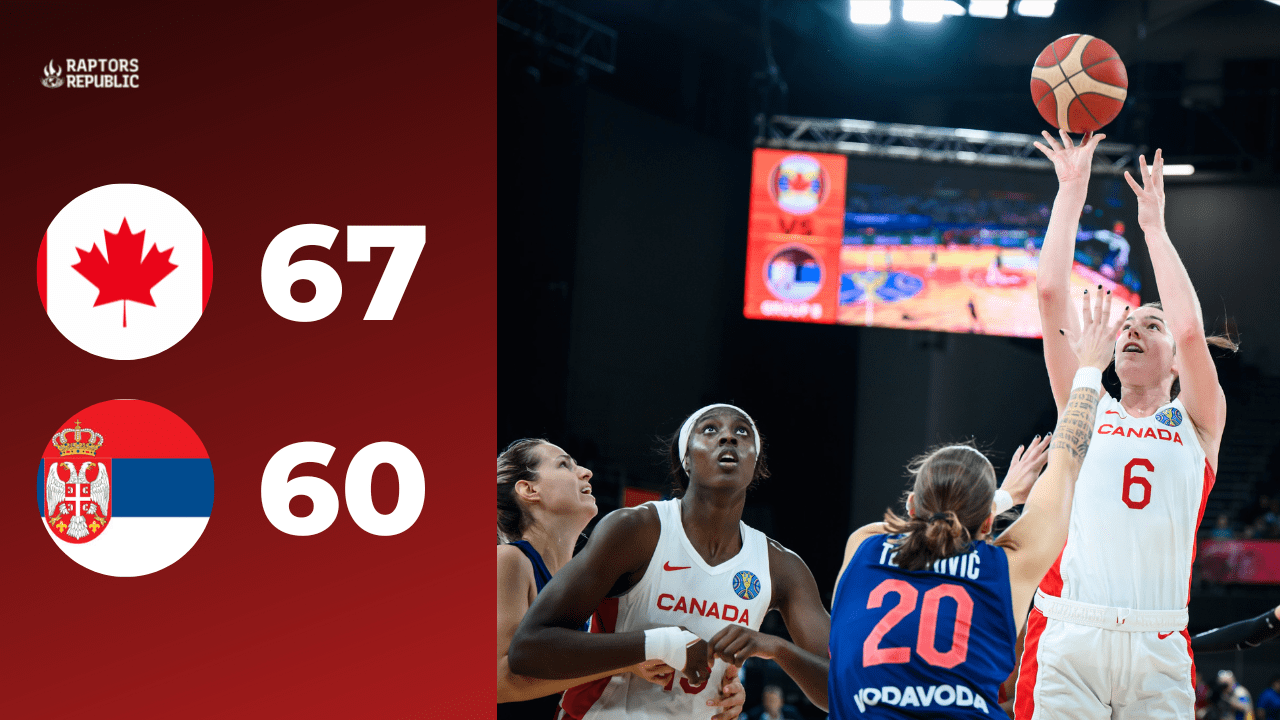In reality, nobody knew what to expect of the new and improved Canadian senior women’s basketball team entering the 2022 FIBA World Cup.
Since the last time we had seen the team a few short months ago at the 2021 Olympics — where Canada lost the opening game to Serbia, 72-68, and went 1-2 in the group stage, failing to advance and finishing 9th in the tournament — Canada had replaced their head coach, seen several key veterans retire, and introduced even more young players to the program.
Nobody knew if it was going to take time for the Canadians to gel and learn how to win together or if their talent and chemistry would carry over from the past, with a few simple tweaks and personnel changes benefiting them.
Fortunately, we got the answer on Monday night, when Canada jumped at the opportunity to get revenge, defeating the No. 10 ranked Serbia 67-60 to improve to 1-0 in the World Cup. They were the better, more focused, and deeper team from opening tip-off, proving to fans that they are a serious threat in the World Cup and, more importantly, to themselves that the belief that they have in each other can translate to wins.
“We realized some things, but especially one: the team’s belief in themselves. And this is the most important for me, during many times today when Serbia pressed, when Serbia did good jobs to come back to the game, the team was ready to make good decisions in that moment,” head coach Victor Lapena said after the game. “But I think if we played two or three more games, maybe even the team will be better right now. But it’s like we are in pre-season. And after Serbia, tomorrow it’s France. This is the most important.”
For a team that is still only in pre-season form according to their coach, Canada looked an awful lot like a well-oiled machine against Serbia. After a slow start where Canada got out-rebounded 6-0 on the offensive glass to trailed 16-15 after one quarter, Canada was excellent from the second quarter onwards, winning the second quarter 23-12 and not giving up a single offensive rebound. They won the game on the defensive end, where their aggressive scheme and elite rim-protection forcing the Serbians to settle for jump shots all night — including 17 threes — where they got outscored 50-40 in the paint.
For Canada, it starts with pressuring the ball at the point of attack and getting their hands in passing lanes to turn the Serbians over 11 times in the first half and 19 times on the night. In fact, Canada’s defense was all-around elite, with Nirra Fields and Shay Colley at the point of attack, staying in front of opposing guards in isolation situations and combining for 3 steals; Bridget Carleton running around and getting her 6-foot-1 frame in passing lanes, ending the night with 2 steals and several deflections; while the three trees in the front court — starters Nathalie Achonwa and Kayla Alexander as well as 21-year-old Laeticia Amihere off the bench — were always in the paint to protect the rim, with two of them on the floor at all times in order to give the team the type of size, length and athleticism that sets them apart on the world stage.
“Kayla Alexander, Euroleague level, many years played in Canada. 32 years old, one of the most important Canadian players in our history,” Lapena said about Alexander, who was Canada’s best player, scoring a team-high 13-points along with 7 rebounds, 1 steal and 2 blocks. “I’m super happy because she’s one of our leaders. Maybe she doesn’t talk too much, her voice, she speaks with her teammates, everybody is, ‘Kayla talked about it, let’s do it.’”
On the other side of the ball, Canada’s offense looked disjointed at times and they struggled to effectively get the ball out of their zone and attack in transition — something made more difficult by Serbia’s full-court press that they employed for most of the second half. But Canada did just enough scoring to keep the score board moving, with the team’s depth proving valuable in this regard, as all seven women who played significant minutes scored between 7 and 13 points, making for a balanced attack.
It started with Kia Nurse. In her first game back from tearing her ACL last October, Nurse was aggressive from the outset, scoring Canada’s first points with an and-one layup and a yell that proved just how much it meant to her to return to the national team and competitive basketball. Nurse showcased her veteran savvy throughout, baiting several Serbian players into offensive fouls and finishing with 9-points, 3 assists and a steal in just 18:50 minutes, as she is on a minutes restriction and likely can’t play much more than 20 minutes per game.
Fields and Colley were an important combination to have handling the ball for all 40 minutes, managing the game extremely well and combining for 20 points on 42 percent shooting. The two of them did a great job not getting rattled and getting Canada into their sets, taking care of the ball despite how aggressive Serbia was at the point of attack and with their full-court press.
Amihere was excellent defensively and as a rebounder, where her switchability and rim protection allow her to play several positions. But what stood out the most about her night was the aggression on the offensive end of the floor, with Amihere taking 12 shots, including a three-pointer, after usually acting as more of a role player with the South Carolina Gamecocks and with the senior team, which she has been a member of since 2017. She finished with 8-points, 3 rebounds, 1 assist and a team-high +8 net rating, but as the team relies on her to do more for them going forward — with Team Canada assistant coach Carly Clark telling me that “we will continue to lean on her more as an important part of our team” — it’s a welcomed sign to see her being so aggressive. The results will come.
When I asked Lapena after the game if he was happy about the pace his team played with and their ability to get out in transition, where they scored 18-points but also passed up several opportunities to run, this is what he said:
“I’m happy that we scored. That the team made good decisions. It doesn’t matter if we play fast or we play slow, the most important thing for this team is to play with good spacing. To have the people in the right spots. And when we have this and we play fast, the team plays very good. When we don’t have the players in the right spots, it doesn’t matter if we play slow or fast, we don’t play good basketball. Even when we play slow, using the full 24-seconds [of the shot clock] ,if our players are in the right spots, the basketball is beautiful.”
Still, for Lapena, more important than defensive execution or offensive spacing is always going to be effort and competitiveness that his team plays with. And the Canadians, who didn’t waste any time putting pressure on the ball or diving on the floor for loose balls, made their new head coach very happy in that regard.
“They don’t give up. They don’t rest on the court… We’ll see if we have enough energy until the end of the tournament to play with this attitude. Because when you play with the maximum energy, good things happen.”
“We are not perfect but we are learning this process.”
Canada plays France next at 4:00am EST on Friday, September 23rd. You can watch it on Sportsnet.



